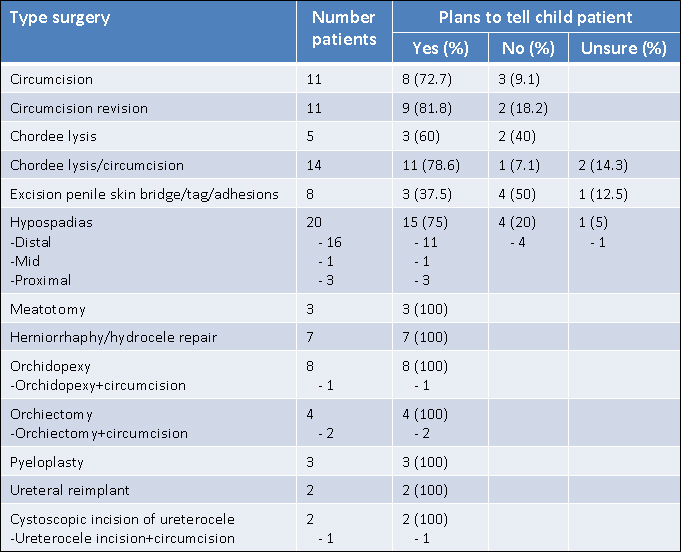|
Back to Fall Congress
To tell or not: parental thoughts on disclosure of urologic surgery to their child
Christina Ching, MD, Heidi A. Stephany, MD, Douglass B. Clayton, MD, John C. Thomas, MD, John C. Pope, IV, MD, Mark C. Adams, MD, John W. Brock, III, MD, Stacy T. Tanaka, MD.
Vanderbilt University, Nashville, TN, USA.
Background:
Literature pertaining to medical disclosure to the pediatric patient is limited to grave subject matter such as cancer and HIV or issues related to adoption and assisted reproduction. We hypothesized that parents would find it difficult to disclose urologic surgery to a child and that there is a need for further education and parental support.
Methods:
Parents of pediatric patients <5 years old undergoing urologic surgery in the operating room were contacted at time of post-operative follow-up phone call. Parents were consented for telephone survey and then asked their future plans of disclosure to their child about their recent surgery, parental comfort with disclosing such information to their child, prior support given and desire for future support in how to tell their child about surgery, and the parent’s own personal experience with childhood surgery. Pediatric patient charts were reviewed for other prior surgeries and major co-morbidities.
Results:
103 parents were contacted in consecutive follow-up phone calls; 98 parents consented to participate. The average age of patient included was 15.7 months (median 8.2 months, range 3.7-57.7 months). The majority (53.1%) of surgeries were minor penile surgeries (circumcision, circumcision revision, chordee lysis, excision penile skin bridge/tag/adhesion, meatotomy). Table 1 lists the types of surgeries and corresponding parental decision about disclosure. Overall, 78 (79.6%) parents would definitely tell their child about their prior surgery with only 11 (14.1%) of these parents feeling nervous to do so. Parents seem to agree in telling their child “when they can understand” however the definition of this ranged in age from 2-16 years old (mean 9 years). 16 parents (16.3%) do not plan to tell their children about surgery, including 4 of the 20 parents of children undergoing hypospadias repair. These 4 parents had all undergone surgery themselves but none at <5 years of age. Overall, there was not a significant association between a parent’s choice to disclose their child’s prior surgery and if the parent had ever had surgery (p=0.25) or specifically surgery at <5 years of age (0=0.68). Prior major surgery or major co-morbidity in the pediatric patient was not predictive of a parent’s choice to disclose either. 33.7% of parents would find it helpful to have guidance in talking to their child despite the overwhelming majority of parents (89.8%) stating no one has ever done so.
Conclusions:
Parents seem relatively comfortable discussing urologic surgeries with a child but about one-third would appreciate further counseling. Those parents willing to avoid specifically telling their child about a surgery seem content to do so unless the child notices a difference post-operatively. Interestingly, 20% of parents of children undergoing hypospadias repair hope to avoid telling their child.
Table 1: Parental decision on whether or not to tell their child about surgery and the type of surgery the patient underwent

Back to Fall Congress
|


